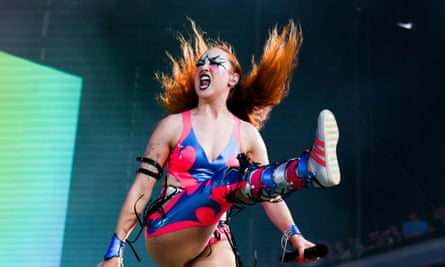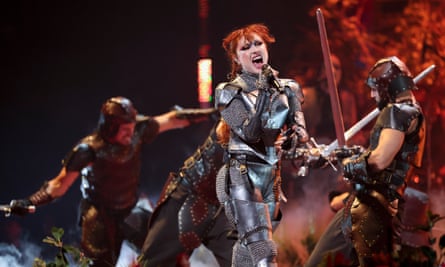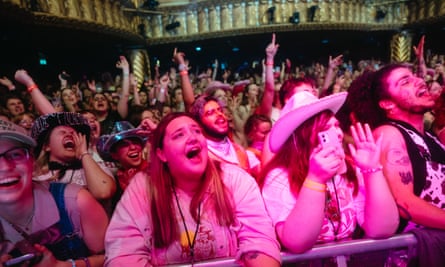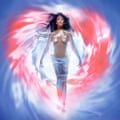Chappell Roan once started a bar fight. A man was talking down to a server and she called him out. He squared up to her, one thing led to another and her friends ended up brawling with him. “If you’re an asshole, I’m gonna be like: ‘Yo, fuck off.’ You don’t get to talk to her like that,” she says: “I’m confrontational.”
“Confrontational” and mega-famous pop star make for an uneasy combo (for her publicist, at least). But in recent months, as Missouri-born Roan has shot from jobbing musician to A-lister thanks to the rise of her single Good Luck, Babe! and her drag-inspired aesthetic, the 26-year-old has spoken out about everything from famous-person problems – abusive fans and photographers – to Palestine and LGBTQ+ rights. Coupled with her dazzlingly fun and flamboyant songs and the fervent fan community she has created, you have the year’s biggest – and most uncompromising – new pop star.
The Roan effect was evident hours before the doors of Manchester Academy opened last Friday, the drab grey main road transformed into a catwalk by a rainbow of characters awaiting the massively oversubscribed first night of Roan’s UK tour. Fans started queueing at 9am; once she came on, the atmosphere turned feral. “This is a place where you belong no matter what,” Roan shouted.
It has taken weeks to pin down Roan: in Manchester, she was too fried to talk after performing two days before at the MTV VMAs in New York, where she won best new artist. Weeks of rehearsals, travel and social media controversies have kept us apart – and I get the impression that her team are prioritising the precarious balance between work and self-care. When we finally connect, it’s Sunday afternoon, four days post VMAs. Roan is in Glasgow sipping a coffee. “I met a highland cow!” she smiles. “It was so soft.”
Aside from her loose, long red hair, Roan cuts a pale figure on my computer screen: her simple grey top is a world away from elaborate stage attire that has seen her dress as a wrestler, Lady Liberty and more. But she talks in long paragraphs, often checking herself. Even asking “How are you?” results in a thoughtful speech as she tries to work out how she is.
It is a complicated question. Roan released her debut album, The Rise and Fall of a Midwest Princess, last September, to appreciation from an intense online fandom. The non-album track Good Luck, Babe! arrived in April, when Roan had about 1m monthly Spotify listeners. Now she has 45m, thanks to word of mouth and footage of her wild live performances luring curious crowds to her recent US festival sets: at Lollapalooza in Chicago last month, she broke attendance records.
This week, Roan had six songs in the US Hot 100 and three in the UK Top 40 (including seductive cheerleader chant Hot to Go! and absurdist come-on Red Wine Supernova). She’s gone from cult figure to icon in less time than it takes to grow out a fringe – and she has been candid about how hard the experience has been. At one show in June, she tearfully told the crowd: “It’s really hard to keep up.” The footage went viral, as did a statement she shared in August about invasive fan behaviour. “I’m not in a delusion of, ‘Oh this is normal’,” she says of life now. “Like, this is very abnormal.”
She is coping “how anyone would”, she says pragmatically. “I’m in therapy twice a week. I went to a psychiatrist last week because I was like, I don’t know what’s going on. She diagnosed me with severe depression – which I didn’t think I had because I’m not actually sad. But I have every symptom of someone who’s severely depressed.” The brain fog, forgetfulness, poor focus and “a very lacklustre viewpoint” all clicked into place when she heard the diagnosis.
“I think it’s because my whole life has changed,” she continues. “Everything that I really love to do now comes with baggage. If I want to go thrifting, I have to book security and prepare myself that this is not going to be normal. Going to the park, pilates, yoga – how do I do this in a safe way where I’m not going to be stalked or harassed?”
Roan’s clear boundaries have promoted a backlash among some fans who have accused her of being “ungrateful”. On the VMAs red carpet, she whirled to face a photographer who had been shouting at her and retaliated: “No, you shut the fuck up.” She went viral again. “I’m very turned off by the celebrity of it all,” she says. “Some girls have been in this so long that they’re used to that, but I’m not that girl. I’m not gonna be a sweetie pie to a man who’s telling me to shut the fuck up.” She knows that some fans don’t want to hear any of this, but stands her ground. “They think I’m complaining about my success. I’m complaining about being abused.”

It can seem as though Roan got everything she has ever wanted – and the weight of it is crushing her. She spent years building a community where queer people like her can feel safe and now fame has robbed her of that feeling. It feels like grief. “Every time I walk through my front door, it just comes out of me,” she says, a slight wobble to her voice. “I can’t even help it, I just start sobbing and either being so angry at myself for choosing this path, or grieving how the curiosity and pure wonder I had about the world is somewhat taken away from me.”
Other famous pop stars have checked in. “Only the girls know how it feels,” she says. “I was warned that it’s going to feel like going through puberty again – my body does feel different. It’s holding tension in a very different way: I have all these new emotions and I’m really confused. It’s how it felt to be 12. I look at [Lady] Gaga and even Sabrina [Carpenter] and Lana [Del Rey] – when I see them going out in public, I can’t even imagine how much they’ve had to prepare for that.”
As a 12-year-old, Roan was Kayleigh Rose Amstutz, writing songs in her bedroom as a creative outlet from her repressive Christian upbringing. She struggled with her sexuality and undiagnosed bipolar II disorder, and railed against her family, the church and the abstinence culture of the Republican midwest. “I was so desperate to feel understood,” she says. “I pushed down the gay part of myself so deep because I was like, that can’t possibly be me.”
It sounds lonely. “Oh, it was,” she says. “I was very, very lonely. When I was growing up, it was like, ‘Gay means flamboyant, gay man’ and lesbian means, ‘Butch girl who looks masculine’. There was not an array of queerness. And I was very mentally ill – suicidal for years – and not medicated, because that’s just not a part of midwest culture. It’s not: ‘Maybe we should get you a psychiatrist.’ It’s: ‘You need God. You need to pray about that.’”
Roan craved escape. She would smoke stolen cigarettes and listen to Del Rey on her porch at 2am as she plotted her way out. After winning a school talent contest, she began posting covers on YouTube. She honed her songwriting at an artsy summer camp and uploaded her first original song in 2014: Die Young was a doomy heartsick ballad sung in a husky Del Rey-esque tone. It led to her signing with Atlantic at 17. She renamed herself Chappell Roan in tribute to her late grandfather and released an EP – but progress was slow and she felt constrained by her sad-girl persona. After moving to Los Angeles in 2018, she wrote a song with Daniel Nigro that felt like a gamechanger: Pink Pony Club, a sizzling cabaret dance-pop banger about her formative experiences visiting a drag bar in LA. Feeling as if she had finally found her people, she started to acknowledge her sexuality. “Drag is like a spa for my soul,” she says, touching her heart.
But Atlantic wasn’t keen, and dropped her in 2020. Pink Pony Club bubbled under but didn’t translate into a viable career. Roan spent two years working other jobs to support her life in LA and, at a low ebb, moved back home to live with her family. Unable to shake the feeling that she could still make it, she gave herself one more year to chase her dream. She returned to LA, worked at a doughnut shop and collaborated with Nigro, who was also involved in Olivia Rodrigo’s Grammy-winning debut, Sour. Together, Roan and Nigro wrote maximalist pop songs that honoured her inner child. Roan filmed videos with friends, styled in thrift-store drag. The result of this scrappy, striving year was The Rise and Fall of a Midwest Princess.
Pop had been in a dark place since the mid-2010s: mumbled confessions over seething beats and sparse bedroom laments. But Roan is an explosion of colour. Her songs are fun, full of camp humour as she sings about the trials of love, acceptance and being ghosted by girls. Her voice blooms from a growl to an operatic trill and back. At the heart of it all is performance. “What would be the funnest to perform live?” she asks herself. “That’s how I write.”
The VMAs was her first big awards show. To perform Good Luck, Babe!, Roan dressed as a knight and strode out with a crossbow, shot a burning arrow to set a castle alight and chucked swords around. “I had that idea of me shooting a crossbow on fire for so long,” she says, laughing at her audacity. “Good Luck, Babe! does not warrant me coming out with a weapon on fire, but I was like, I have to do it. This is what I really would have wanted as my 11-year-old boy version of myself.”

While it can seem like Roan hates every second of being a pop star, she lights up as she talks about how bigger budgets and more agency have transformed her shows. “I get to feel the energy of other people, it’s so cool to have shows so packed and have so much joy in the room,” she says. “It’s fun that my parents are so supportive. It’s just cool to see my family get excited about things that we never thought were possible.”
And she is using her newfound status for good. Since Roan became a headline act, she’s invited local drag artists to support her (an idea suggested to her by queer masked country singer Orville Peck) and each show has its own theme. At her Manchester show, the theme is mermaid, and the atmosphere is celebratory and communal. One fan, Jasmine, resplendent in shiny purple suit and stick-on face charms, hails Roan’s “sense of freedom – I would never dress like this on an ordinary day”. Another, Emelia, in an astonishing homemade jellyfish get-up, says: “I’m gay and live in Newcastle, and a lot of people judge me for being quite flamboyant.”
For every UK tour ticket sold, £1 goes to the LGBTQ+ rights charity Kaleidoscope Trust, and at the merch stand in Manchester there are signed risograph prints selling for £100, with proceeds going towards aid for Palestine. Wearing charity shop costumes, fans Kenza and Freya say they admire Roan’s values: “She’s probably the only artist that’s really standing up for things that no one else is wanting to talk about.”

Of the prints, Roan says very carefully: “It’s just my duty to help send resources to a community that is absolutely being destroyed.” And even though Kamala Harris used her deliriously goofy Femininomenon in a campaign video (“What we really need is a femininomenon!”) and seemingly copied the design of an official Roan baseball cap, Roan hasn’t endorsed her. And, in June, while dressed as Lady Liberty, Roan told the crowd at Governor’s Ball festival in New York that she had declined an invitation to perform at a White House Pride event: “We want liberty, justice and freedom for all. When you do that, that’s when I’ll come.”
“I have so many issues with our government in every way,” she says. “There are so many things that I would want to change. So I don’t feel pressured to endorse someone. There’s problems on both sides. I encourage people to use your critical thinking skills, use your vote – vote small, vote for what’s going on in your city.” The change she wants to see in the US in this election year, she says instantly, is “trans rights. They cannot have cis people making decisions for trans people, period.”
On stage in Manchester, Roan purrs, “Oh, you already know the words” before Hot to Go – as if anyone here doesn’t. She serenades a wig and slips in an unreleased song, The Subway, a lovelorn ballad about desperately trying to get over an ex. It’s been tricky trying to write more new music amid this year’s madness. She’s excited about a handful of new songs, including a country track (“I just really love the campiness of country music”), and plans to take “a good chunk of time off” to write, re-centre and maybe move to Seattle.
Despite the difficulties, she is also enjoying growing into her status. “It’s awesome to say no to things, even though they’re offering a lot of money. I have the power to say no.” She pauses. “And it is nice to have the pop star treatment. To be like, ‘I would love to go see Alanis Morissette and Joan Jett. They want me to sit in a suite? Okaaaaay!’” Roan stops and smiles the biggest smile of the whole interview, even bigger than the highland cow grin. “There is a lot of fun.”
Source: theguardian.com

















